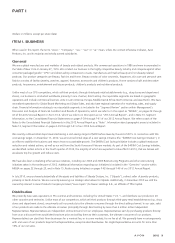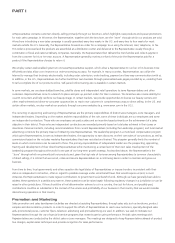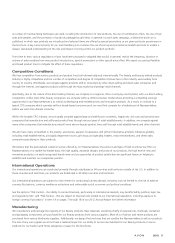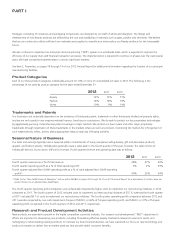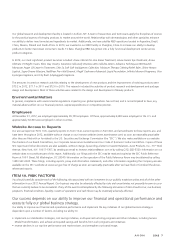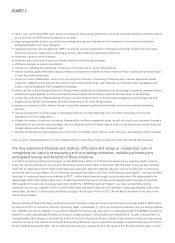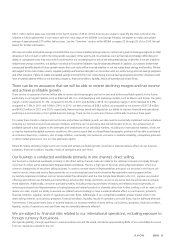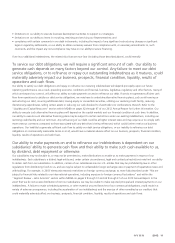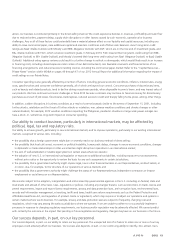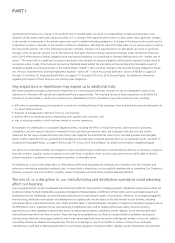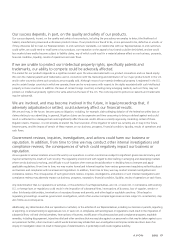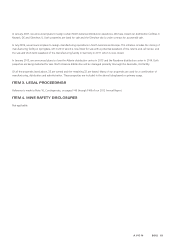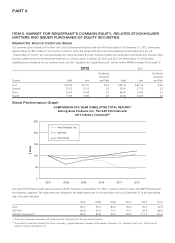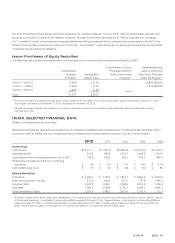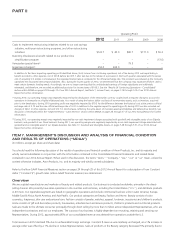Avon 2012 Annual Report Download - page 20
Download and view the complete annual report
Please find page 20 of the 2012 Avon annual report below. You can navigate through the pages in the report by either clicking on the pages listed below, or by using the keyword search tool below to find specific information within the annual report.above, our business is conducted primarily in the direct-selling channel. We could experience declines in revenues, profitability and cash flow
due to reduced orders, payment delays, supply chain disruptions or other factors caused by such economic, operational or business
challenges. Any or all of these factors could potentially have a material adverse effect on our liquidity and capital resources, including our
ability to issue commercial paper, raise additional capital and maintain credit lines and offshore cash balances. Avon’s long-term credit
ratings are Baa2 (Stable Outlook) with Moody’s and BBB- (Negative Outlook) with S&P, which are on the low end of investment grade, and
BB+ (Stable Outlook) with Fitch, which is below investment grade. In February 2013, Fitch lowered their long-term credit rating from BBB-
(Negative Outlook) to BB+ (Stable Outlook) and Moody’s lowered their long-term credit rating from Baa1 (Negative Outlook) to Baa2 (Stable
Outlook). Additional rating agency reviews could result in a further change in outlook or downgrade, which would likely result in an increase
in financing costs, including interest expense under certain of our debt instruments, less favorable covenants and financial terms of our
financing arrangements, and reduced access to lending sources, including the commercial paper market. Refer to the “Capital Resources –
Private Notes” section within MD&A on pages 46 through 47 of our 2012 Annual Report for additional information regarding the impact of
credit ratings on our Private Notes.
Consumer spending is also generally affected by a number of factors, including general economic conditions, inflation, interest rates, energy
costs, gasoline prices and consumer confidence generally, all of which are beyond our control. Consumer purchases of discretionary items,
such as beauty and related products, tend to decline during recessionary periods, when disposable income is lower, and may impact sales of
our products. We face continued economic challenges in fiscal 2013 because customers may continue to have less money for discretionary
purchases as a result of job losses, foreclosures, bankruptcies, reduced access to credit and sharply falling home prices, among other things.
In addition, sudden disruptions in business conditions as a result of a terrorist attack similar to the events of September 11, 2001, including
further attacks, retaliation and the threat of further attacks or retaliation, war, adverse weather conditions and climate changes or other
natural disasters, for example, 2012 weather conditions impacting the Philippines, pandemic situations or large scale power outages can
have a short- or, sometimes, long-term impact on consumer spending.
Our ability to conduct business, particularly in international markets, may be affected by
political, legal, tax and regulatory risks.
Our ability to achieve growth, particularly in new international markets, and to improve operations, particularly in our existing international
markets, is exposed to various risks, including:
• the possibility that a foreign government might ban or severely restrict our business method of direct selling;
• the possibility that local civil unrest, economic or political instability, bureaucratic delays, changes in macro-economic conditions, changes
in diplomatic or trade relationships or other uncertainties might disrupt our operations in an international market;
• the lack of well-established or reliable legal systems in certain areas where we operate;
• the adoption of new U.S. or international tax legislation or exposure to additional tax liabilities, including exposure to tax assessments
without prior notice or the opportunity to review the basis for any such assessments in certain jurisdictions;
• the possibility that a government authority might impose legal, tax or other financial burdens on our Representatives, as direct sellers, or
on Avon, due, for example, to the structure of our operations in various markets; and
• the possibility that a government authority might challenge the status of our Representatives as independent contractors or impose
employment or social taxes on our Representatives.
We are also subject to the adoption, interpretation and enforcement by governmental agencies in the U.S. (including on federal, state and
local levels) and abroad of other laws, rules, regulations or policies, including any changes thereto, such as restrictions on trade, license and
permit requirements, import and export license requirements, privacy and data protection laws, anti-corruption laws, environmental laws,
records and information management, e-invoicing, tariffs and taxes, health care reform requirements such as the Patient Protection and
Affordable Healthcare Act, and regulation of product claims or ingredients, which may require us to adjust our operations and systems in
certain markets where we do business. For example, privacy and data protection laws are subject to frequently changing rules and
regulations, which may vary among the various jurisdictions where we operate. If we are unable to adhere to or successfully implement
processes in response to changing regulatory requirements, our business and/or reputation may be adversely affected. We cannot predict
with certainty the outcome or the impact that pending or future legislative and regulatory changes may have on our business in the future.
Our success depends, in part, on our key personnel.
Our success depends, in part, on our ability to retain our key personnel. The unexpected loss of or failure to retain one or more of our key
employees could adversely affect our business. Our success also depends, in part, on our continuing ability to identify, hire, attract, train,
A V O N 2012 13


